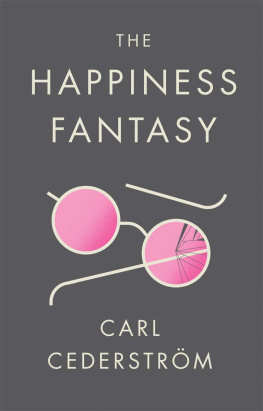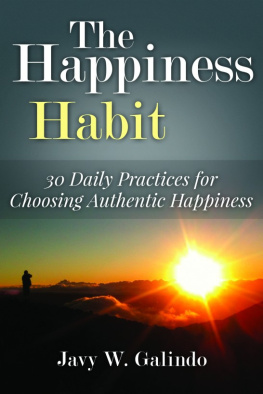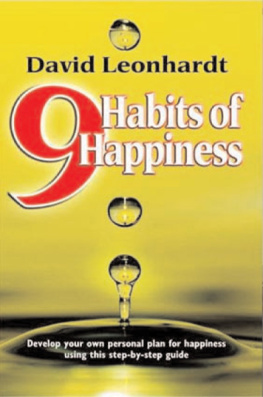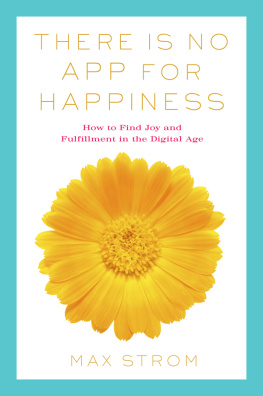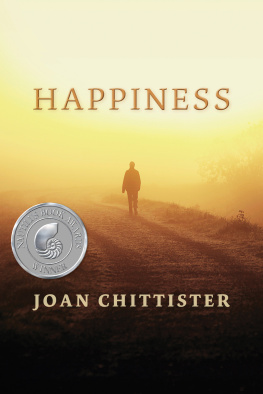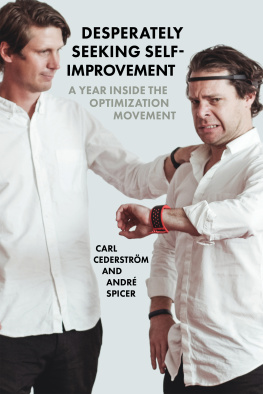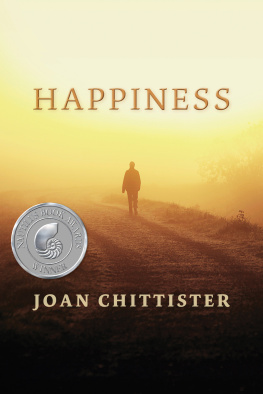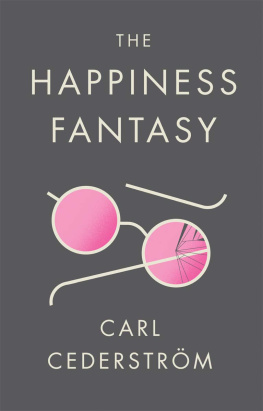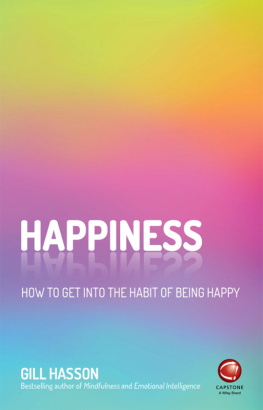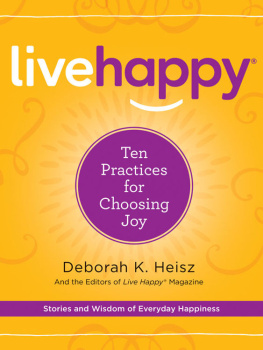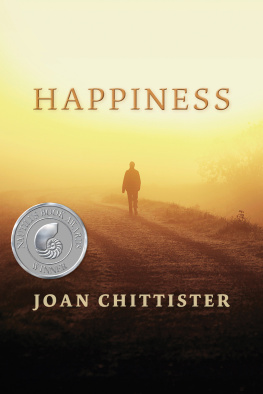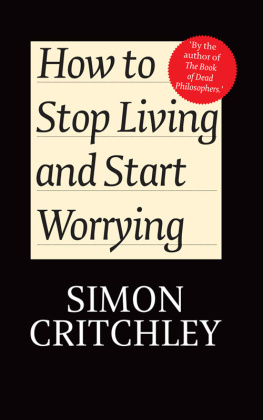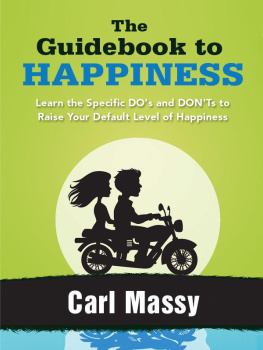Contents
Guide
Pages

With compelling clarity, wit, and wisdom, Carl Cederstrm cuts through the disabling illusions ceaselessly promoting the personal pursuit of happiness, offering instead an altogether richer, more compassionate, embrace of life and its vicissitudes.
Lynne Segal, author of Radical Happiness:
Moments of Collective Joy
In this lively and acerbic book, Carl Cederstrm provides a compelling history of how a particular psychoanalytic ideal of happiness sucked us in, promising total fulfilment but ultimately trapping us in a lie.
Will Davies, Goldsmiths, University of London
A wonderful piece of work.
Simon Critchley, New School for Social Research
Happiness is big business and big politics these days. But as Cederstrm reveals in this sharp and engaging book, its recent history can be disturbing. Combining humour with a much-needed scepticism, he shows that in a world of happiness, not all is smiles.
Darrin M. McMahon, author of Happiness: A History
Pleasure was at the heart of the liberation struggles of the 1960s but has morphed into a new form of ideology and tyranny, fed by the capitalist logic of incessant consumption. The happy self is not only a fantasy, an imperative to fulfil our potential, but also the impulse behind a wide variety of economic enterprises, orgasmic workshops, drugs, therapies, etc. Cederstrms The Happiness Fantasy is a well-written, lively, and critical study of the fantasy that has wormed inside the core of our culture.
Eva Illouz, Hebrew University of Jerusalem
The Happiness Fantasy
Carl Cederstrm
polity
Copyright Carl Cederstrm 2018
The right of Carl Cederstrm to be identified as Author of this Work has been asserted in accordance with the UK Copyright, Designs and Patents Act 1988.
First published in 2019 by Polity Press
Polity Press
65 Bridge Street
Cambridge CB2 1UR, UK
Polity Press
101 Station Landing
Suite 300
Medford, MA 02155, USA
All rights reserved. Except for the quotation of short passages for the purpose of criticism and review, no part of this publication may be reproduced, stored in a retrieval system or transmitted, in any form or by any means, electronic, mechanical, photocopying, recording or otherwise, without the prior permission of the publisher.
ISBN-13: 978-1-5095-2384-9
A catalogue record for this book is available from the British Library.
Library of Congress Cataloging-in-Publication Data
Names: Cederstrm, Carl, 1980- author.
Title: The happiness fantasy / Carl Cederstrm.
Description: Medford, MA : Polity Press, [2018] | Includes bibliographical references and index.
Identifiers: LCCN 2018004122 (print) | LCCN 2018006644 (ebook) | ISBN 9781509523849 (Epub) | ISBN 9781509523801 (hardback) | ISBN 9781509523818 (pbk.)
Subjects: LCSH: Happiness.
Classification: LCC BF575.H27 (ebook) | LCC BF575.H27 C43 2018 (print) | DDC 152.4/2--dc23
LC record available at https://lccn.loc.gov/2018004122
The publisher has used its best endeavours to ensure that the URLs for external websites referred to in this book are correct and active at the time of going to press. However, the publisher has no responsibility for the websites and can make no guarantee that a site will remain live or that the content is or will remain appropriate.
Every effort has been made to trace all copyright holders, but if any have been inadvertently overlooked the publisher will be pleased to include any necessary credits in any subsequent reprint or edition.
For further information on Polity, visit our website: politybooks.com
Introduction
Judge: Just what is it that you want to do?
Heavenly Blues: Well, we wanna be free. We wanna be free to do what we wanna do.
The Wild Angels (1966)
The Happiness Fantasy An Obituary
As an expression of what we desire and long for, the happiness fantasy is a shared fantasy of the good life. Like all fantasies, it brings together a set of moral values functioning as a kind of road-map to the happy life. The nature of these fantasies changes over time and space. For the ancient Greeks, the ultimate happiness fantasy was a still and quiet life of contemplation. To get there was not easy. You had to rise above yourself, break out of the ordinary condition of being human, and cultivate a long list of virtuous faculties.
The happiness fantasy that will concern me in these pages is the fantasy that has dominated the rich West for almost a century. It is a fantasy of self-actualization, according to which there is only one way to become happy, and that is by reaching your full potential as a human being. It is to live in a spirit of authenticity, where you are called upon to live your life, as opposed to someone elses life. It is to pursue happiness in the form of pleasure, whereby the most rudimentary daily activities become moments of potential joy. And it is to submit yourself to the market, working hard to develop your brand and gain a competitive edge.
In short, it is a fantasy of realizing your true inner potential, both as a market resource and as a human being. This happiness fantasy emerged as an idea in the 1920s, reached its peak in the 1960s, and came to a definite end in the early hours of 9 November 2016.
Just before 3 a.m., in the Hilton Ballroom on Manhattan in New York City, Donald Trump slowly came down the stairs from the side of the stage to the soundtrack of Air Force One, giving a double-thumbs up, before addressing the cheering audience:
Working together, we will begin the urgent task of rebuilding our nation and renewing the American Dream. Ive spent my entire life in business, looking at the untapped potential in projects and in people.
On my way to the university that morning I kept hearing those two words ringing in my head: untapped potential. They had been on my mind for a while. I had talked about the human potential movement in my previous lecture, showing clips from seminar trainings in the 1960s with people screaming and shouting as a technique for stripping away layers of their inauthentic selves to reach their true potential.
These scenes were taken from the Esalen Institute in California, which opened in 1962. Throughout the Sixties, Esalen was the go-to place for people who wished to explore their inner beings. Psychedelic drugs and Eastern mysticism were combined with modern psychology to test new routes to expand and extend the human self. The theme for the first season was human potentiality, an idea that had come to one of the organizers after attending a talk by Aldous Huxley a couple of years earlier in which he extolled the need to recognize the fact that that all people are different, and to find ways to actualize all peoples potentialities.
In contrast to Huxley, Trump has never been interested in human differences. His women look the same, as do his men. He does not share the anti-authoritarian ethos of the human potential movement, but talks and acts like an autocrat. In the year that has passed since he took office, Trump has tried to impose a travelling ban targeting people from mostly Muslim countries to enter the United States, cracked down on LGBT rights, and outspokenly supported white supremacists.
In my reading, the idea of human potentiality reflects not just a version of the American Dream but also a vision of happiness, a vision that has spread across the Western world over the last century, optimistically suggesting that everyone can take control over their lives and actualize their inner potential. I argue that this is a kind of fantasy, as I put it in the title of this book. But when I say fantasy, I am not suggesting that this version of happiness is unreal. On the contrary, it is a fantasy that is very real insofar as it has mobilized peoples emotions and, by extension, the way they envision the good life.

